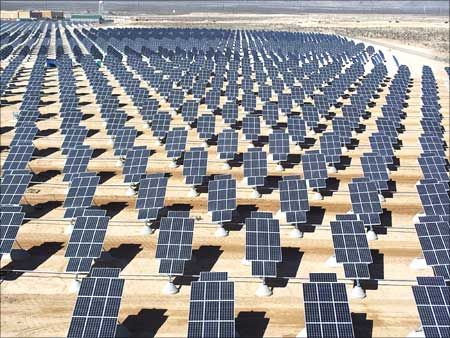
The International Energy Association has forecast that the sun could be the largest source of energy, globally, by 2050, rues T N Ninan
Astonishing things are happening on the energy front.
Half the new power capacity to be created in the Gulf states in the next few years will be based on energy from the sun.
The capital cost of solar energy installations has dropped to one per cent of what it was three decades ago, and the price of energy per unit has dropped by more than a half in the last five or six years.
Solar power is now cheaper than what electricity would cost if based on either oil at $50 per barrel, or its coal equivalent -- or for that matter liquefied natural gas.
Solar energy has become the new energy source in many countries in Africa and South America, and, of course, in India with its massive solar energy programme.
The International Energy Association has forecast that the sun could be the largest source of energy, globally, by 2050. Wind energy may not be far behind.
That’s one strand in the emerging energy scenario.
In the United States, the automobile industry has been asked to improve the fuel efficiency of its vehicles by more than 50 per cent by 2025 -- to about 22 km per litre of petrol.
If achieved, it will reduce US oil demand by as much as India’s annual imports. On top of which there is the prospect of electric cars gaining in popularity.
Already, Tesla’s Elon Musk has acquired the cult status that Apple’s Steve Jobs used to enjoy.
Though electric cars account for just one per cent of all cars sold worldwide, it is safe to forecast that that figure will jump as the major car makers up their electric car programmes, and as the required supporting infrastructure gets created.
Between solar power, electric cars and improved fuel efficiency, the developed world as a whole will see oil demand begin to fall. Whatever increased demand gets created for hydrocarbons will come from countries like India and China.
These are multiple mini-revolutions with massive implications -- for the price of oil (and, for that matter, coal), for the future of oil-dependent economies, for the fate of the 6 million Indians working in some of those economies, perhaps even for the debate on climate change.
Already, the major economies of West Asia are waking up to the prospect that oil prices may never go back up to the levels that prevailed in the first of 2014; they are cutting back on spending and intend to slash subsidies.
Autocratic rulers who have to ask their people to tighten their belts may well feel a new nervousness.
It is possible that, as a consequence of such changes, some of the Indians working in oil-rich countries will find their jobs evaporating. So what India gains on energy import costs, it may lose in remittances.
Still, it is worth recalling that every macroeconomic crisis in India’s recent history, going back more than 40 years, was set off by an oil price shock (sometimes combining with a poor monsoon).
This was true of the rampant inflation of 1973-74, the need for an International Monetary Fund bailout loan in 1980-81, and the foreign exchange crisis of 1990-91.
The experts say that oil prices henceforth will stay below $70 per barrel, partly because of the price-moderating influence of shale oil.
The experts have been wrong before, but it is possible that an important stress-point for the economy has become less of a risk than at any other time since 1970.
These trends need to be encouraged with the help of supportive government policies -- like, say, a bigger carbon tax (especially diesel) that brings externalities into cost calculations.
Subsidies on hydrocarbon products like kerosene (used mostly for lighting) should be abolished, so that solar energy gets a fair chance.
The emission norms for the automobile industry should be tightened quickly. And the infrastructure for electric vehicles should be put in place.



.jpg)








 © 2025
© 2025